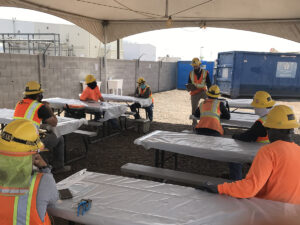Summary: A toolbox talk is a short, focused safety meeting held at the start of the workday on electrical jobsites. These quick discussions help crews stay alert, aligned, and prepared for the day’s tasks. In the electrical trades—where work involves live current, high places, and changing conditions—toolbox talks reinforce safety as a daily habit and team responsibility.
If you’ve ever seen a crew gathered early in the morning on a jobsite, looking like they’re in a huddle, you might’ve wondered what they’re doing. Odds are, it’s not small talk, it’s a toolbox talk—a quick, but essential, safety meeting.
In the electrical trades, safety training isn’t something you do once and move on from. Safety is a part of the job, every single day. Electrical workers work with live current, elevated spaces, tight corners, sharp tools, and changing conditions. It can be high-risk work, which is why staying focused and informed isn’t optional. That’s exactly what toolbox talks are for.
Let’s take a closer look at what toolbox talks are, why they matter, and what you can expect from them in the electrical field.
What’s a Toolbox Talk?
A toolbox talk is a short safety meeting that happens before the workday begins, usually right on the jobsite. It’s designed to get the crew aligned on safety before anyone touches a tool, climbs a ladder, or approaches live equipment.
Toolbox talks typically last 5 to 15 minutes and focus on one specific safety topic. They’re quick, but powerful.
They’re called “toolbox” talks because, traditionally, they were held around the toolbox before work began. These days, they can happen wherever the crew is gathered, as long as the message gets across clearly.
What Topics Are Covered in Toolbox Talks?

Toolbox talks can cover just about anything related to safety, but the best toolbox talks are relevant to the work being done that day. In electrical work, some common topics include:
- Working near live panels
- Proper use of PPE (personal protective equipment)
- Lockout/tagout procedures
- Ladder and lift safety
- Arc flash awareness
- Heat stress and cold weather safety
- Preventing slips, trips, and falls
But the list doesn’t stop here. If it’s something that could affect your safety on the job, it’s worth talking about.
Who Leads the Toolbox Talk?
Toolbox talks are usually led by the foreperson or site supervisor, but that responsibility may rotate. Experienced electricians or even apprentices may lead the conversation.
Leading a toolbox talk shows responsibility, awareness, and trust. It’s a great opportunity for newer electrical workers to build confidence and for seasoned workers to lead by example.
Why Toolbox Talks Matter in the Electrical Trades
Electrical work can be high-risk. Live circuits, unpredictable weather, tight spaces, and other trades working nearby – all bring their own unique hazards. That’s why safety isn’t a one-time training, it’s an everyday discipline.
Even if you’ve already learned about PPE or fall protection, hearing it again right before you start work brings it into focus, and talking about it together opens lines of communication.
Toolbox talks also serve as a reminder that you’re never working alone when it comes to staying safe. Safety is a team effort and the first priority on any jobsite.
Thinking About a Career as an Electrical Worker?
Toolbox talks are just one part of the daily rhythm of life in the trades. They reflect what this career is really about: showing up prepared, working with purpose, and being part of a team that always has your back.
If you’re ready to start a career that’s hands-on, high-skill, and where your safety is always the highest priority, there’s no better place to begin than the electrical trades.
